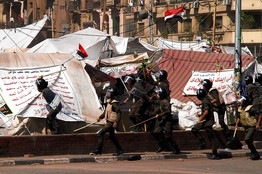UPDATES
Post revolutionary Egypt: An Arab Winter?
August 3, 2011 | Sharyn Mittelman

Recent events and polling in Egypt indicate that pro-democracy activists are weakening, and that Egypt may be heading down an Islamist path.
New polls not only suggest that the Islamist Muslim Brotherhood is likely to win the November election, but also that Amr Moussa, known for his criticism of Israel will be elected President. The polls also reveal that a majority of respondents want to amend or revoke the peace agreement with Israel.
Another worrying trend is the rise of the Islamic Sulafi movement – which calls for Egypt to become an Islamic state under Sharia law. Their force in Egyptian politics was recently on display on Friday July 29, when over 100,000 protestors demonstrated in Tahrir Square calling for an Islamic state.
The New York Times writes:
“Some activists were already calling Friday’s demonstration a turning point – a remarkable display of the Islamists’ ability to monopolize space, be it Tahrir Square, the streets or the coming elections, and of their skill at organization and mobilization, which for secular activists served as a bitter contrast to their own shortcomings.”
The Islamists, with popular and military support, appear to be now turning violent on the secularist and pro-democracy movements, which have been the major public face of the Egyptian revolution, effectively ousting them from the public square.
The Age reported:
“Activists who had been occupying the square since July 8 to denounce the military rulers’ handling of the transition to government, were beaten and the tents that had been their base were ripped apart by soldiers who swarmed into the area on Monday. By nightfall, the square was all but deserted, littered with the belongings the protesters were not given a chance to retrieve.”
The Wall Street Journal reported:
“On Monday afternoon, the first day of the Ramadan fast, hundreds of Egyptian army troops and central security police attacked the tent city on the square, shooting in the air and shouting “Allahu Akbar,” God is Great. Protesters’ belongings were dumped into garbage trucks. The soldiers beat the activists with truncheons and arrested dozens. The protesters who ran into surrounding streets encountered a hostile mob that included local shopkeepers and business owners.”
Egypt’s secular and liberal activists campaigned for postponing parliamentary elections, that were planned for June in order to organise themselves and better compete against the more established Islamists.
Elections are now planned for November, but the liberals and the secularists do not appear ready for elections having set up rival parties and are feuding among themselves. In addition, the calls of these activists are not resonating with many Egyptians who fear that public unrest has led to further economic turmoil.
As the Wall Street Journal noted:
“Squeezed between an assertive military and the country’s resurgent Islamist movement, many Internet-savvy, pro-democracy activists are finding it increasingly hard to remain relevant in a post-revolutionary Egypt that is struggling to overcome an economic crisis and restore law and order.”
Pro-democracy activists have been critical of the military as part of the ‘old regime’, however the Muslim Brotherhood and Salafi movement have been careful not to criticise the military. The Islamists calls’ for stability and piety have echoed the calls for the military, and an alliance between them may now be forming.
These trends suggest that post-revolutionary Egypt could go the way of post-revolutionary Iran, which too began with the activism of liberal protestors, who were ultimately ousted and violently supressed by Khomeni and his Islamist followers. If the pro-democracy movement fails in Egypt, the most populous and important Arab state, the Arab Spring will likely lead to a cold winter across the region.
Tags: Egypt





